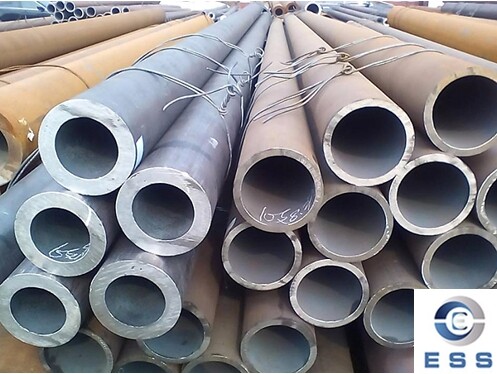
Material of boiler tubes
Boiler tubes are pipes used
to transport hot water or steam. The choice of their materials has an important
impact on the performance and service life of the boiler. Here are some common
choices for the boiler pipe material:
1. Carbon steel
Carbon steel is one of the most commonly used materials in boiler
tubes, such as 20G, etc. It has good mechanical properties and welding
properties, and has high strength and corrosion resistance. Carbon steel boiler
tubes are mainly used to manufacture high-pressure and higher-parameter boiler
pipes, such as superheaters, reheaters, economizers, etc.
2. Alloy steel
Alloy steel is a certain amount of one or more alloying elements added
to carbon steel to improve certain properties of steel. In boiler tubes, common
alloy steels include 15CrMoG, 12Cr1MoVG, etc. These materials have higher
strength, hardness and heat resistance, so they perform well in high
temperature and high pressure environments. Alloy steel boiler tubes are mainly
used in high-temperature and high-pressure working environments, such as
boilers with higher steam parameters.
3. Other materials
In addition to carbon steel and alloy steel, stainless steel, copper
and copper alloys, and nickel alloys are also used in the manufacture of boiler
tubes.
Stainless steel has good corrosion resistance and is often used in
water tubes of water storage boilers.
Copper and copper alloys are often used in boiler smoke pipes and some
heat exchangers due to their good thermal conductivity and corrosion
resistance.
Nickel alloys are suitable for high temperature and high pressure
boiler tubes due to their excellent high temperature resistance and corrosion
resistance.
The materials of burn-resistant boiler tubes mainly include carbon
steel, alloy steel such as 15CrMoG, 12Cr1MoVG, etc., and stainless steel. These
materials have good mechanical properties and high temperature resistance, and
are suitable for boilers with different working conditions and temperature
requirements. The selection of specific materials should be determined
according to the actual working conditions, pressure and temperature
requirements of the boiler:
1. Carbon steel boiler tubes
It has good mechanical properties and weldability, and is widely used
in general industrial boilers and pressure vessels. The price of carbon steel pipes is relatively
affordable, and it also shows stable performance at room temperature and medium
and high temperatures.
It should be noted that carbon steel may produce graphitization under
long-term high temperature environment, so its use temperature is best
controlled below 450℃.
2. Alloy steel boiler tubes
In order to improve the high temperature and pressure resistance of
boiler tubes, alloy steel materials are widely used in high-pressure and
high-temperature boilers.
For example, alloy steel tubes such as 15CrMoG and 12Cr1MoVG can still
maintain excellent thermal strength and oxidation resistance in the high
temperature range of 500-580℃. The addition of these alloy elements such as
chromium and molybdenum enhances the high temperature resistance and corrosion
resistance of steel, making alloy steel boiler tubes an ideal choice for high
temperature and high pressure environments.
3. Stainless steel boiler tubes
Stainless steel boiler tubes are known for their excellent corrosion
resistance and high temperature resistance. This material is particularly
suitable for use in corrosive gases or special working environments, such as
boilers in chemical plants or coastal areas.
Although the price of stainless steel boiler tubes is relatively high,
their excellent performance and long life make the investment return very
considerable.
Summary
In summary, the material selection of refractory boiler tubes needs to
be determined according to the specific application scenarios and working
conditions. Carbon steel boiler tubes are suitable for general industrial
boilers, alloy steel boiler tubes are more suitable for high temperature and
high pressure environments, and stainless steel boiler tubes are the first
choice for corrosive environments and special working conditions. When choosing
the material of boiler tubes, factors such as cost, performance, and
convenience of maintenance should also be considered.













 Eastern Steel Manufacturing Co.,Ltd not only improve product production and sales services, but also provide additional value-added services. As long as you need, we can complete your specific needs together.
Eastern Steel Manufacturing Co.,Ltd not only improve product production and sales services, but also provide additional value-added services. As long as you need, we can complete your specific needs together.










